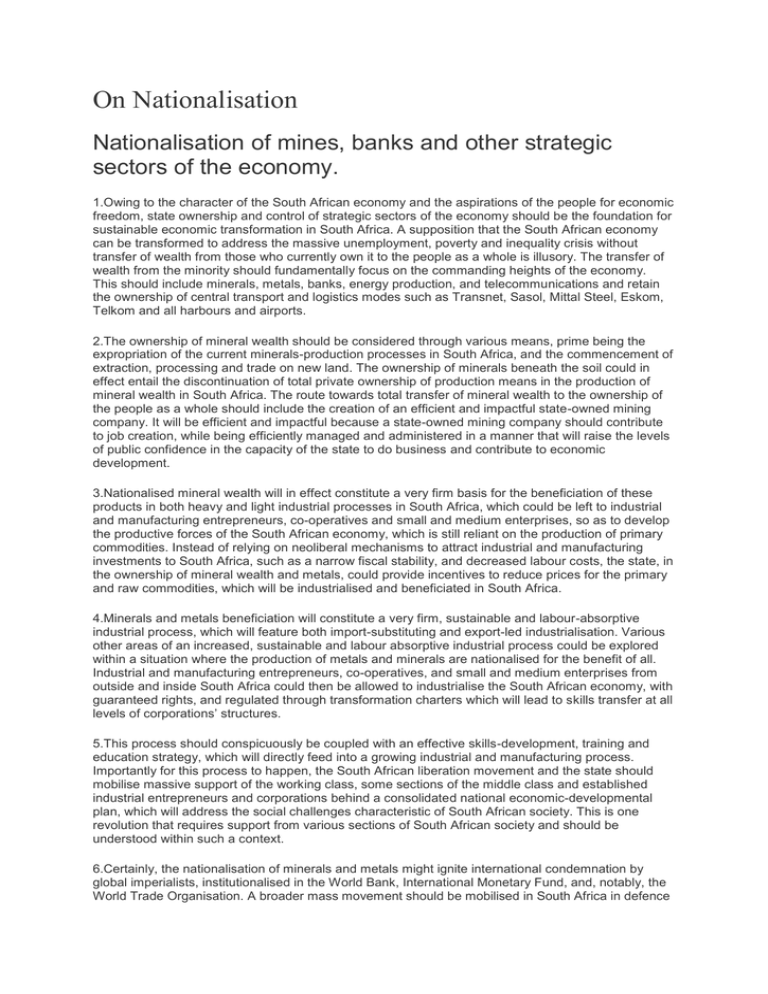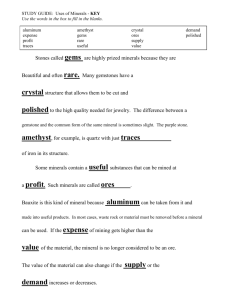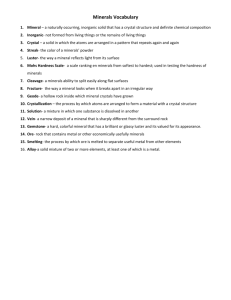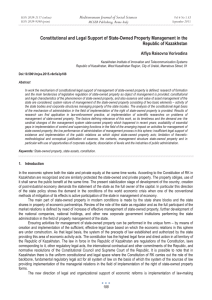Policy On Nationalisation
advertisement

On Nationalisation Nationalisation of mines, banks and other strategic sectors of the economy. 1.Owing to the character of the South African economy and the aspirations of the people for economic freedom, state ownership and control of strategic sectors of the economy should be the foundation for sustainable economic transformation in South Africa. A supposition that the South African economy can be transformed to address the massive unemployment, poverty and inequality crisis without transfer of wealth from those who currently own it to the people as a whole is illusory. The transfer of wealth from the minority should fundamentally focus on the commanding heights of the economy. This should include minerals, metals, banks, energy production, and telecommunications and retain the ownership of central transport and logistics modes such as Transnet, Sasol, Mittal Steel, Eskom, Telkom and all harbours and airports. 2.The ownership of mineral wealth should be considered through various means, prime being the expropriation of the current minerals-production processes in South Africa, and the commencement of extraction, processing and trade on new land. The ownership of minerals beneath the soil could in effect entail the discontinuation of total private ownership of production means in the production of mineral wealth in South Africa. The route towards total transfer of mineral wealth to the ownership of the people as a whole should include the creation of an efficient and impactful state-owned mining company. It will be efficient and impactful because a state-owned mining company should contribute to job creation, while being efficiently managed and administered in a manner that will raise the levels of public confidence in the capacity of the state to do business and contribute to economic development. 3.Nationalised mineral wealth will in effect constitute a very firm basis for the beneficiation of these products in both heavy and light industrial processes in South Africa, which could be left to industrial and manufacturing entrepreneurs, co-operatives and small and medium enterprises, so as to develop the productive forces of the South African economy, which is still reliant on the production of primary commodities. Instead of relying on neoliberal mechanisms to attract industrial and manufacturing investments to South Africa, such as a narrow fiscal stability, and decreased labour costs, the state, in the ownership of mineral wealth and metals, could provide incentives to reduce prices for the primary and raw commodities, which will be industrialised and beneficiated in South Africa. 4.Minerals and metals beneficiation will constitute a very firm, sustainable and labour-absorptive industrial process, which will feature both import-substituting and export-led industrialisation. Various other areas of an increased, sustainable and labour absorptive industrial process could be explored within a situation where the production of metals and minerals are nationalised for the benefit of all. Industrial and manufacturing entrepreneurs, co-operatives, and small and medium enterprises from outside and inside South Africa could then be allowed to industrialise the South African economy, with guaranteed rights, and regulated through transformation charters which will lead to skills transfer at all levels of corporations’ structures. 5.This process should conspicuously be coupled with an effective skills-development, training and education strategy, which will directly feed into a growing industrial and manufacturing process. Importantly for this process to happen, the South African liberation movement and the state should mobilise massive support of the working class, some sections of the middle class and established industrial entrepreneurs and corporations behind a consolidated national economic-developmental plan, which will address the social challenges characteristic of South African society. This is one revolution that requires support from various sections of South African society and should be understood within such a context. 6.Certainly, the nationalisation of minerals and metals might ignite international condemnation by global imperialists, institutionalised in the World Bank, International Monetary Fund, and, notably, the World Trade Organisation. A broader mass movement should be mobilised in South Africa in defence of these massive economic reforms, because they constitute the core of our economic emancipation programme. Mass campaigns on what nationalisation (people and state ownership and control) of minerals, metals and other strategic sectors of the economy will entail should be conducted to garner support from the people as a whole. 7.The benefits of nationalising strategic sectors of the economy will include, but not be limited to, the following realities:1.An increased fiscus for, and therefore more resources for, education, housing, healthcare, infrastructure development, safety and security and sustainable livelihoods for our people. - More jobs for our people because state-owned and controlled mines will increase the local beneficiation and industrialisation of mineral resources. This will, in turn, reduce the high levels of poverty consequent of joblessness. - More equitable spatial development because state-owned and controlled mines will invest in areas where mining is happening. - Better salaries and working conditions in mines because state-owned mines will increase the mining wage and improve compliance with occupational health and safety standards. - Greater levels of economic and political sovereignty, as the state will be in control and ownership of strategic sectors of the economy, which produce mineral resources needed around the world. 8 It is important to highlight that, as part of this programme, the transfer of wealth to the ownership of the people as a whole is not limited to mines only, but should necessarily extend to monopoly industries. The creation of a State Bank and the nationalisation of the Reserve Bank constitute an immediate task and essential to the development of the South African economy, as it can be progressively positioned to improve the existence of state-owned development finance institutions, in order to finance new industries. The State Bank will also provide enterprise finance, housing finance and vehicle finance for all South Africans in a manner that promotes development, not the narrow pursuit of profits. 9 The EFF-led government will establish a State Bank, which should be accompanied by the transformation of the financial sector as a whole, particularly banking and insurance industry practices and norms. Finance capital dominates the world economy and carries with it the potential to undermine all efforts to build a better life for all people. Vigilance and greater state participation in the financial sector is therefore a vital component of efforts to build a sustainable and better life for all the people of South Africa. India and China were firmly insulated from the global financial crisis because their state-owned and controlled financial sectors did not venture into the practices of private banks in the West that led to the collapse of the world economy. The EFF will limit foreign ownership of strategic and monopoly sectors, where the state does not exert full ownership, in order to protect South Africa’s sovereignty and to limit the repatriation of profits, so that these can be used for the further development of our people.









